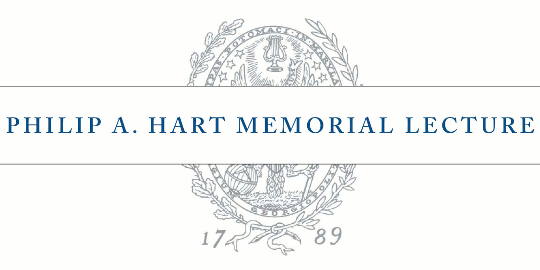Date
3-17-2010
Description
On March 17, 2010, Professor Waldron, University Professor and Professor of Law at New York University, Chichele Chair of Social and Political Theory at All Souls College, Oxford delivered the Georgetown Law Center’s thirtith annual Philip A. Hart Lecture: “ Constitutionalism: A Skeptical View.”
Professor Waldron teaches legal and political philosophy at New York University School of Law. He was previously University Professor in the School of Law at Columbia University. He holds his NYU position conjointly with his position as Chichele Professor of Social and Political Theory at the University of Oxford (All Souls College). For 2011-2013, he is in New York in the Fall and in Oxford in the Spring.
He studied for degrees in philosophy and in law at the University of Otago in New Zealand. He was admitted as a Barrister and Solicitor of the Supreme Court of New Zealand in 1978. He studied at Oxford for his doctorate in legal philosophy, and taught at Oxford University as a Fellow of Lincoln College from 1980-82. From 1982-1987, he taught political theory at the University of Edinburgh, and from 1987-1995, he was a Professor of Law in the Jurisprudence and Social Policy Program in the School of Law (Boalt Hall) at the University of California, Berkeley. He was briefly at Princeton, as Laurance S. Rockefeller University Professor of Politics, before moving to New York in 1997.
Professor Waldron has written and published extensively in jurisprudence and political theory. His books and articles on theories of rights, on constitutionalism, on the rule of law, and on democracy, judicial review, property, torture, security, and homelessness are well known, as is his work in historical political theory (on Aristotle, Thomas Hobbes, John Locke, Jeremy Bentham, John Stuart Mill, and Hannah Arendt).
Professor Waldron gave the second series of Seeley Lectures at Cambridge University in 1996, the 1999 Carlyle Lectures at Oxford University, the Spring 2000 University Lecture at Columbia, the Wesson Lectures at Stanford in 2004, the Storrs Lectures at Yale Law School in 2007, the Tanner Lectures at Berkeley in Spring 2009, the Holmes Lectures at Harvard Law School in 2009, and the Hamlyn Lectures in Law in the UK in 2011. He has delivered public lectures all over the world, from Buenos Aires to Jerusalem. He was elected a Fellow of the British Academy in 2011 and a Member of the American Academy of Arts and Sciences in 1998. In April 2011, he was awarded the American Philosophical Society's prestigious Phillips Prize for lifetime achievement in jurisprudence.
This paper examines the ideology that goes by the name of "constitutionalism." The first part of the paper considers the significance of "written constitutions" The second part of the paper casts a skeptical eye at conceptions of constitutionalism that emphasize "limited" government. Once "limited government" is contrasted carefully with "restrained government" (restraints upon specific actions by government) and with "controlled government" (e.g. insistence upon democratic control), we see that the association of constitutionalism with general limitations on the scope of government ought to make it a much more controversial ideal than the general anodyne acceptance of the term "constitutionalism" might lead us to expect. Finally, the anti-democratic implications of constitutionalism are explored. The paper argues that, by insisting on limited government, constitutionalism downplays the important role that constitutions have to perform in the modern world in establishing and securing specifically democratic authority.
Scholarly Commons Citation
Waldron, Jeremy, "Constitutionalism: A Skeptical View" (2010). Philip A. Hart Memorial Lecture. 4.
https://scholarship.law.georgetown.edu/hartlecture/4

